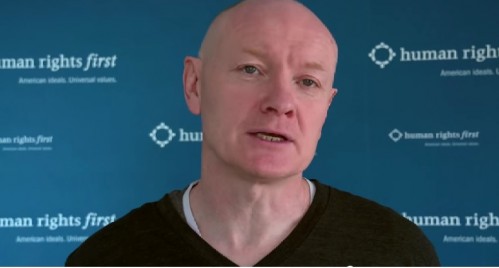Activist Brian Dooley from Human Rights First said that we are in a new context because of the Coronavirus, indicating that “people, like Naji Fateel and other human rights defenders, should not be imprisoned with or without the virus.”
In an interview with the Gulf Institute for Democracy and Human Right, Dooley stated “I think that there is a new conversation now to be had to because of the virus, i.e. the government ought to be emptying its prisons,” indicating that “it’s just puzzling and frustrating that they [Bahraini authorities] haven’t taken that obvious next step of releasing the peaceful opposition figures and human rights defenders, [especially that] some of these people are old and have underlying health concerns.” “If for the moment not forgetting the argument that they shouldn’t be in prison at all and concentrate on the other argument that they ought to be released on health grounds, I think that this needs to happen fast.”
“Whatever the government thinks about those political prisoners on a personal level, it really ought to be thinking about its own employee, the prison officers and prison guards. The more prisoners you have, the more likely that they are going to get infected and the more likely that more guards get infected,” he added.
“What happens if some of these very prominent prisoners who are internationally known all around the world, like Nabeel Rajab and Abdulhadi Al-Khawaja, and who are actually internationally more famous than any of the ruling family in Bahrain, get infected,” Brian wandered, indicating that “it’s going to be a huge problem for the Bahraini government how they are going to explain that the prominent human rights defenders died from the virus, because the Bahraini government refused to release them.”
Dooley stressed that keeping these people in prison in unsanitary conditions would fuel the situation, indicating that time is running and every delay in releasing these people would subject them to a greater chance of being infected. He noted that the infection of one of the prisoners could do more damage to the reputation of the ruling family.
Dooley hoped that there are “within the Bahraini regime people who understand that it’s not about being soft on political and recognize that in terms of the calculation of risk assessment, wondering “Do you really want to risk the lives of these internationally known human rights activists? Do you want them to get more infected? What a nightmare for the Bahraini government to have to explain why it didn’t release these people!” “I just hope that there are people smart enough and sensible enough within the government to be arguing for the release of those activists.”
He further stated that for the past nine years, human rights organizations have been pushing for the release of certain prisoners, but the government continues to refuse, but now there is something new in the equation, and if the Bahraini government wants a way out without losing face, it can sign the release of these prisoners on health grounds, and everyone will praise it. Dooley highlighted that this is the ideal opportunity and that the Bahraini government is required to act fast, because the virus isn’t waiting around for it to make a decision.
Commenting on the NIHR visit and the resulting punishment of prisoners, the imprisonment of journalist Mahmoud Al-Jaziri in solitary confinement and the prevention of others from contacting their families, Dooley said “I think this is a problem that the Bahraini government has created for itself really over the years. It doesn’t tell the truth and lie about all sorts of things including prison conditions,” pointing out that the Bahraini government is no longer a reliable source, and no one will believe its version of events except individuals who have been raised to be loyal to the government. The Bahraini government history is full of constant lies and the evidence is that human rights organizations members have been denied access to Bahrain since years, including me. It is almost impossible for the international media to enter and conduct such an investigation.
We have signed petitions for the release of Nabeel Rajab, Abdulhadi Al-Khawaja, Naji Fateel, Hassan Mushaima, Sheikh Ali Salman and others. The Bahraini government should look at this now from a different angle, this is not only a threat to the prisoners’ health, but also to the health of its employees, and to the surrounding civil society. It is likely that members of the ruling family would be infected with the virus, as no one can be spared. The British Prime Minister has also been infected.
Dooley addressed the Bahraini people saying that it has been a long struggle and it is not over. There is more to the Bahraini story. But what’s happening these days about the Coronavirus is witnessing long struggles, such as the American civil rights movement. This will last for generations. “You just have to keep pushing for reform. These dictatorships regimes crumble pretty quickly as in the Soviet union, even if they seemed strong.”
The interview with activist Brian Dooley comes as part of #Release_Bahraini_Prisoners campaign, launched by a group of Bahraini activists days ago on social media outlets, to call on the Bahraini authorities to release Bahraini prisoners amid serious concerns over the Coronavirus outbreak and the poor conditions they are suffering from inside the prisons.
Source:



 العربية
العربية